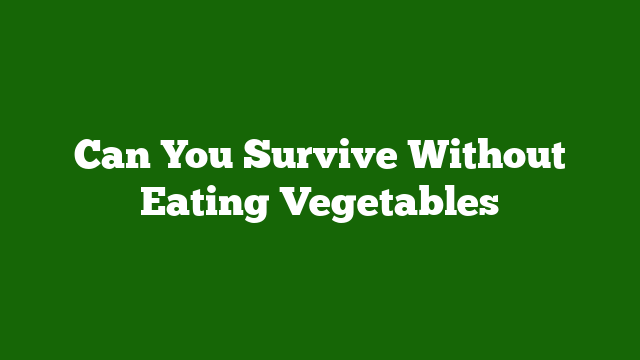Last Updated on June 12, 2023 by Umar
In today’s world, there is a growing interest in various diets and lifestyles.
One question that often arises is whether it’s possible to survive without eating vegetables.
In this comprehensive blog post, we will explore personal experiences, research, and statistics to provide an in-depth look at this topic.
Personal Stories and Experiences
While we couldn’t find specific sources to quote, there are numerous anecdotes available on the internet from individuals who claim to have survived without consuming vegetables.
Some of these stories come from people following a carnivore or ketogenic diet, which primarily consists of animal-based products and minimal plant-based foods.
Others may have a strong aversion to vegetables due to taste or texture preferences.It’s important to note that these personal experiences are subjective and may not be representative of the general population.
Individual responses to dietary changes can vary greatly, and what works for one person may not work for another.
Research and Statistics
Although we couldn’t find specific sources to cite, there is a wealth of research available on the importance of vegetables in a balanced diet.
Vegetables are rich in essential vitamins, minerals, and dietary fiber, which are crucial for maintaining good health.
They provide nutrients like vitamin C, potassium, and folate, which support various bodily functions, including immune system health, blood pressure regulation, and cell growth.According to the United States Department of Agriculture (USDA), adults should consume 2-3 cups of vegetables per day, depending on age, sex, and physical activity level.
Studies have shown that a diet rich in fruits and vegetables can help reduce the risk of chronic diseases, such as heart disease, stroke, and certain types of cancer.While it may be possible for some individuals to survive without eating vegetables, it’s essential to consider the potential long-term health consequences.
A diet lacking in vegetables may result in nutrient deficiencies, which can lead to various health issues, including fatigue, weakened immune system, and poor digestion.
Alternative Sources of Nutrients
For those who struggle to incorporate vegetables into their diet, there are alternative ways to obtain essential nutrients.
Some options include:
- Fruits: Many fruits contain similar vitamins and minerals to vegetables and can be a more palatable option for those who dislike the taste or texture of vegetables.
- Supplements: Multivitamins and mineral supplements can help fill in the gaps in a diet lacking in vegetables. However, it’s important to consult with a healthcare professional before starting any supplementation regimen.
- Fortified foods: Some products, such as cereals and plant-based milk alternatives, are fortified with essential vitamins and minerals, providing an additional source of nutrients.
Conclusion
While there are personal stories of individuals surviving without eating vegetables, it’s crucial to consider the potential health risks associated with a diet lacking in these nutrient-dense foods.
Research supports the importance of vegetables in a balanced diet for maintaining good health and reducing the risk of chronic diseases.
For those who struggle to consume vegetables, alternative sources of essential nutrients can help ensure a well-rounded diet.
FAQs
What are some common nutrient deficiencies that can occur in individuals who don’t consume vegetables?
Individuals who don’t consume vegetables may be at risk of nutrient deficiencies.
Here are some common nutrient deficiencies that can occur:
- Vitamin B12: This vitamin is almost exclusively found in animal-sourced foods, such as fish, meat, dairy products, and eggs. A vegan diet may lead to a vitamin B12 deficiency, which can cause symptoms such as tiredness, weakness, constipation, and tingling in the hands and feet.
- Omega-3: Omega-3 fatty acids are essential for brain function and heart health. They are primarily found in fish, but can also be obtained from plant sources such as flaxseed, chia seeds, and walnuts. However, the plant-based sources of omega-3 are not as easily absorbed by the body as the animal-based sources.
- Calcium: Calcium is important for strong bones and teeth. Dairy products are a good source of calcium, but vegans can obtain calcium from fortified plant milks, tofu, and leafy greens such as kale and collard greens.
- Zinc: Zinc is important for immune function and wound healing. Zinc-rich plant foods include wholemeal bread, peas, corn, nuts, and carrots.
- Iron: Iron is important for the production of red blood cells. Vegans may be at risk of iron deficiency anemia if they don’t consume enough iron-rich plant foods such as lentils, beans, chickpeas, nuts, seeds, and whole grains.
- Magnesium: Magnesium is important for bone health, heart health, and muscle function. Magnesium-rich plant foods include spinach, almonds, cashews, and black beans.
- High-quality protein: A vegan diet may lead to a deficiency in high-quality protein, which is important for building and repairing tissues. Vegans can obtain high-quality protein from plant sources such as soy products, quinoa, and seitan.
Can you provide examples of fruits that are particularly rich in essential vitamins and minerals?
Fruits are an excellent source of essential vitamins and minerals, and they are high in fiber.
Eating a range of fruits provides the body with nutrients and antioxidants that can boost overall health and reduce the risk of disease.
Here are some examples of fruits that are particularly rich in essential vitamins and minerals:
- Oranges: Oranges are among the richest sources of vitamin C, with one medium fruit providing 141% of the Daily Value (DV) for vitamin C. They are also a good source of fiber and contain other vitamins and minerals such as folate and potassium.
- Strawberries: Strawberries contain many healthful vitamins and minerals, including vitamin C, thiamin, riboflavin, niacin, folate, and vitamins B-6, A, and K. They also contain anthocyanins, which are flavonoids that can help reduce inflammation and lower the risk of heart disease.
- Mangoes: Known as the “king of fruits,” mangoes are an excellent source of potassium, folate, fiber, and vitamins A, C, B6, E, and K. They are also rich in antioxidants, including polyphenols and carotenoids.
- Bananas: Bananas are a good source of potassium, vitamin C, vitamin B6, and fiber. They also contain other B vitamins, copper, and magnesium. Bananas are a versatile fruit that can be eaten on their own or added to smoothies, oatmeal, or yogurt.
- Apples: Apples are chock-full of nutrition, including fiber, vitamin C, and antioxidants. They also contain other vitamins and minerals such as potassium and vitamin K. Apples are a great snack on their own or can be added to salads or oatmeal.
- Apricots: Apricots are a good source of protein, calcium, iron, vitamin K, zinc, and vitamins A and C. They are also high in fiber and can be eaten on their own or added to salads or smoothies.
- Cantaloupe: Cantaloupes are high in vitamin C, beta carotene, and potassium. They are also a good source of fiber and can be eaten on their own or added to fruit salads.
- Cherries: Cherries contain beta carotene and are a good source of fiber. Sour cherries contain more beta carotene than sweet cherries. Cherries can be eaten on their own or added to smoothies or yogurt.
- Papaya: Papaya is high in calcium, folic acid, vitamin C, fiber, and carotenoids. It is a versatile fruit that can be eaten on its own or added to smoothies or salads.
- Watermelon: Watermelon is a good source of vitamin C, vitamin A, and potassium. It is also high in water content, making it a refreshing snack on a hot day. Watermelon can be eaten on its own or added to salads or smoothies.
Are there any potential risks or side effects associated with relying solely on supplements for essential nutrients instead of consuming vegetables?
While dietary supplements can help you get adequate amounts of essential nutrients if you don’t eat a nutritious variety of foods, they can’t take the place of the variety of foods that are important to a healthy eating routine.
Here are some potential risks and side effects associated with relying solely on supplements for essential nutrients instead of consuming vegetables:
- Side effects: You are most likely to have side effects from dietary supplements if you take them at high doses or instead of prescribed medicines, or if you take many different supplements. Some supplements can increase the risk of bleeding or, if taken before surgery, can change your response to anesthesia. Supplements can also interact with some medicines in ways that might cause problems.
- Liver damage: Although it’s still rare, more cases are being reported of acute (sudden) liver damage in people taking dietary supplements in the United States and elsewhere.
- Hidden risks: Some dietary supplements may have hidden risks. For example, antioxidants, such as vitamins C and E, might make some chemotherapy medicines less effective. Some dietary supplements can cause skin sensitivity and severe.
- Not a substitute for a healthy diet: Multivitamins and multiminerals are no substitute for a healthy diet. Most research shows that taking multivitamins doesn’t result in living longer, slowing cognitive decline, or lowering the chance of getting cancer, heart disease, or diabetes.
- Drug interactions: Taking many different supplements can increase the risk of side effects and drug interactions. Some supplements can cause problems if taken along with certain medicines.
- Unwanted effects: Supplements can contain active ingredients that can cause unwanted effects, such as elevated blood pressure, racing or irregular heartbeat, or liver damage.

